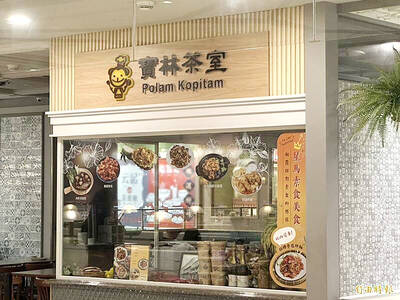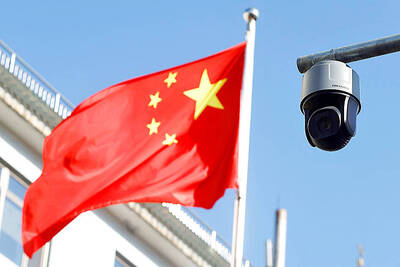Taipei Times: You have often said that your political career is greatly inspired and influenced by former minister of justice Chen Ding-nan (陳定南), and have pledged to carry on “the spirit of Chen Ding-nan” in your governance. In light of the indictment of Tainan City Council Speaker Lee Chuan-chiao (李全教) and others over their alleged involvement in vote-buying in last year’s speaker election, do you see any conflict between your desire to implement “the spirit of Chen Ding-nan” and interaction with traditional local political culture?
William Lai (賴清德): Earlier, I mentioned that the DPP [Democratic Progressive Party] has a very important set of founding principles: integrity, diligent government and love of country. In my opinion, Chen is the embodiment of this value. Integrity and diligent government are values that must be pursued and upheld by politicians. The same goes for me when I face the council.
Democratic politics is party politics. When the DPP holds a majority in the council, the council speakership ought to be served by a DPP member. Of course, there is room for exceptions if the KMT — despite being a minority in the council — has an excellent candidate to attract support from DPP members. Then there must be free will, and the candidate must possess convincing credentials. However, this is not the case we are seeing here; [Lee was elected] via vote-buying.
TT: The case is now in the hands of the judiciary. There has been criticism that you are making a judgement before the court hands out a ruling. What is your response to this criticism?
Lai: Refrain from making judgements before the court rules is a principle of the Criminal Procedural Act (刑事訴訟法), which rests on the idea of the presumption of innocence, in which one is considered innocent until proven guilty. That is the principle from the perspective of the Criminal Code.
However, in my view, taking the helm at the council is a personnel matter; therefore, the idea of presumption of innocence is inapplicable.
For example, if police officers are implicated in a corruption case and are indicted, they would have to leave the post. The government’s civil servant structure sets different conditions for removal depending on what positions are involved. For example, when the prosecutor-general is indicted, he or she needs to be held responsible and step down from the post; local heads and township wardens alike would need to resign from their posts if found guilty in a first ruling.
In the same vein, given that the council speakership is a personnel matter, the idea of the presumption of innocence is inapplicable in this case, because the person concerned needs to be held accountable for political responsibility.
I know that Lee participated in vote-buying. Five DPP members succumbed to vote-buying; for those who were not lured away, they certainly would report the matter with the party. So we know for a fact that [the vote-buying] took place. It is inappropriate for us to bury our head in the sand like an ostrich and deny it, to refuse to face it, oppose it and solve it, and simply leave it to the judiciary to deal with it. I do not think that is a responsible way of dealing with the matter.
There certainly are criticisms about my decision not to attend the council meetings [until Lee’s case is finalized in a second ruling], panning me for [what critics describe as] lack of respect for the [judicial] system. However, there are voices of support as well, affirming my decision to safeguard democracy and courage not to pander to a stained system. That is why I said I am indifferent to people’s praise or blame.
Why am I so persistent in this decision? Two reasons: One is to return respect to Tainan, for Tainan has been a “sacred place” for Taiwan’s democracy, where everyone is proud of Tainan’s democracy and history. It is therefore utterly regrettable that it has been marred as a result of the Lee case. I am the city’s mayor; if I do not have the moral courage to defend the dignity of Tainan residents and oppose “black gold” politics, I would feel that I have let the people of Tainan down.
Second, it is my hope that, through my refusal to step in the council, national attention can be drawn to Tainan and expose the problem, letting sunshine in and allowing the start of a new political reform that begins here, in Tainan.
In the past when people talked about reform, the topic usually revolved around central agencies such as the Presidential Office, the Executive Yuan and the political parties, without touching on the local level, where people take it as a matter of course that “black gold” is rampant in local politics. This is wrong. All politics begins from the local level; national politics will never be corruption-free as long as local politics is not clean.
TT: Leveraging on your experience from visits overseas to conduct city exchanges, what can Taiwan do to increase its international visibility? Last year, you also visited China and the US. Based on your observations, are you concerned that Taiwan may be “sacrificed” because of the ties between the US and China?
Lai: Taiwan needs to be confident in itself. It is impossible for Taiwan to be sacrificed by any nation because — first off — in terms of its population and territories, Taiwan is not necessarily small. It ranks in the middle of about 190 nations. Second, Taiwan’s economy is the world’s 15th or 16th largest. Third, Taiwan is a free and democratic country.
Not only does Taiwan not have to worry about being “sold out,” so to speak, we should be even more confident and active in taking part in maintaining peace and security in the Asia-Pacific region. Only by participating first can you have a role, and only when you have a role can you have a status or a position.
TT: You’ve once said the core issue to cross-strait relations is that both sides of the Taiwan Strait are lying to each other. Could you elaborate?
Lai: Whether it is person-to-person relations or country-to-country relations — particularly in the case of Taiwan-China relations — the most basic and fundamental way to solve disagreements is for both sides to be honest. Being honest means both sides need to fully acknowledge that disparities exist between them. Without such an acknowledgment in the first place, how can [the two parties] work to solve the disagreement? However, what we’ve see in the past [between Taiwan and China] is that both sides lie to each other.
China hopes to “unify” with Taiwan, whereas the majority of Taiwanese — as shown in various surveys — want Taiwan to be an independent nation and not part of China. How could China not know about that? However, in the past five or six years, when KMT figures went to China for exchanges, they portrayed a picture as if Taiwan also wants “unification” with China. What they did in effect was lie to China while lying to themselves.
For China’s part, it clearly is aware that mainstream public opinion in Taiwan is different from what the KMT has portrayed, but because China also needs to carry out a “united front” (統戰) among its people, it is also lying to itself as well as lying to others [its own people].
In my opinion, the divergence between Taiwan and China on the issue of independence and unification is not the problem: The biggest disparity is the fact that they are lying to each other. A classic example born out of them lying to each other is this so-called “1992 consensus,” a term they use to candy-wrap the lie within.
China as of today has been unwilling to say to Taiwanese that the “consensus” means “each side of the Taiwan Strait has its own interpretation of what ‘one China’ means [an interpretation the KMT has been telling Taiwanese]; all it says is just the phrase “1992 consensus” without specifying publicly what the term entails.
If China were to acknowledge Taiwan’s mainstream hopes for the nation to be an independent sovereignty, and at the same time be upfront about its hope to “unify” with Taiwan — it then would bring both sides to the place where China, wanting to “unify” with Taiwan, would have to list its terms in wanting to change the “status quo” [as Taiwan now is a de jure sovereignty].
Hence, I keep on calling for an approach of “seeking common ground while shelving differences (求同存異).” Shelving differences means both sides first seek to understand and acknowledge the disparities between them, while not being in a rush to solve them. Seeking common ground means conducting exchanges. Having exchanges first allows room for mutual understanding, which would lead to tolerance before eventually bringing about reconciliation — and finally — peace.

POLAM KOPITIAM CASE: Of the two people still in hospital, one has undergone a liver transplant and is improving, while the other is being evaluated for a liver transplant A fourth person has died from bongkrek acid poisoning linked to the Polam Kopitiam (寶林茶室) restaurant in Taipei’s Far Eastern Sogo Xinyi A13 Department Store, the Ministry of Health and Welfare said yesterday, as two other people remain seriously ill in hospital. The first death was reported on March 24. The man had been 39 years old and had eaten at the restaurant on March 22. As more cases of suspected food poisoning involving people who had eaten at the restaurant were reported by hospitals on March 26, the ministry and the Taipei Department of Health launched an investigation. The Food and

A fourth person has died in a food poisoning outbreak linked to the Xinyi (信義) branch of Malaysian restaurant chain Polam Kopitiam (寶林茶室) in Taipei, Deputy Minister of Health and Welfare Victor Wang (王必勝) said on Monday. It was the second fatality in three days, after another was announced on Saturday. The 40-year-old woman experienced multiple organ failure in the early hours on Monday, and the family decided not to undergo emergency resuscitation, Wang said. She initially showed signs of improvement after seeking medical treatment for nausea, vomiting and diarrhea, but her condition worsened due to an infection, he said. Two others who

The long-awaited Taichung aquarium is expected to open next year after more than a decade of development. The building in Cingshui District (清水) is to feature a large ocean aquarium on the first floor, coral display area on the second floor, a jellyfish tank and Dajia River (大甲溪) basin display on the third, a river estuary display and restaurant on the fourth, and a cafe and garden on the fifth. As it is near Wuci Fishing Port (梧棲漁港), many are expecting the opening of the aquarium to bring more tourism to the harbor. Speaking at the city council on Monday, Taichung City Councilor

Taiwanese should be mindful when visiting China, as Beijing in July is likely to tighten the implementation of policies on national security following the introduction of two regulations, a researcher said on Saturday. China on Friday unveiled the regulations governing the law enforcement and judicial activities of national security agencies. They would help crack down on “illegal” and “criminal” activities that Beijing considers to be endangering national security, according to reports by China’s state media. The definition of what constitutes a national security threat in China is vague, Taiwan Thinktank researcher Wu Se-chih (吳瑟致) said. The two procedural regulations are to provide Chinese